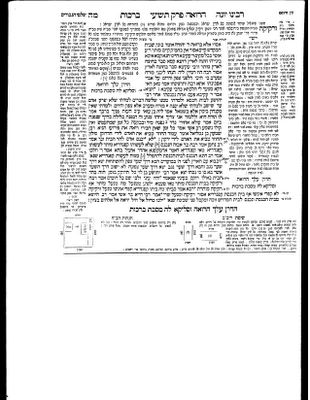
HIDE/SHOW IMAGE
45a
{Brachot 61b continued}
where he is in sight of it.
Rabbi Yehuda says: When the Temple is in existence it is forbidden, when the Temple is not in existence it is permitted.
Rabbi Akiva prohibits in all instances.
Rabbi Akiva, this was {the same position as} the first Tanna?
There is a distinction between them: outside Israel. That the first Tanna maintains that outside Israel it is permitted, while Rabbi Akiva maintains that outside Israel it is forbidden. Rabba had bricks placed for him east and west, such that he would sit and answer the call of nature north and south. Abaye went and changed them round to north and south. Rabbah went in and readjusted them. He said, Who is this that is annoying me? The halacha is like Rabbi Akiva.
{Brachot 62a}
They learnt {in a brayta}: Rabbi Akiva said: Once I went in after Rabbi Yehoshua to a privy, and I learnt from him three things. I learnt that one does not sit east and west but north and south; I learnt that one evacuates not standing but sitting; and I learnt that it is proper to wipe with the left hand and not with the right. Said Ben Azzai to him: Did you dare to take such liberties with your master? He replied: It was a matter of Torah, and I required to learn.
Who is a modest man? One who eases himself by night in the place where he eased himself by day.
Ulla said: Behind a fence one may ease himself immediately; in an open field, so long as he can break wind without anyone hearing it.
Rav Ashi said: As long as the exposed part of his body cannot be seen.
{Brachot 62b}
They learnt {in a brayta}: Rabban Shimon ben Gamliel says: To keep back the fecal discharge causes dropsy; to keep back the urinary discharge causes jaundice.
{The Mishna had stated:} "A MAN SHOULD NOT ENTER THE TEMPLE MOUNT":
Rav Nachman cited Rabba bar Avua: If one enters a synagogue not intending to use it as a short cut {kapandaria}, he may use it as a short cut {kapandaria}.
What is a kapandaria?
It is as if a man said, instead of going round the blocks [makkifna adari], I will go in here.
{Thus, an Aramaic etymology. Rabba, earlier, said kimashmao. Meaning, as Soncino notes, that the Latin word compendiaria is sufficient.}
Rav Chelbo cited Rav Huna: If one entered a synagogue to pray, it is a mitzvah to use it as a short cut {the Rif has the girsa mitzvah, as opposed to our girsa, muttar, it is permitted - this is when going in to pray from one entrance, one should use the opposite exit}, as it says (in Yechezkel 46:9)
shul is permitted.
What is the reason?
We learn from wearing a shoe. Just as wearing shoes is permitted, so too is spitting permitted.
{Brachot 63a}
Rava said: Like his house.
Just as in his house, taking a shortcut, people object, but wearing shoes and spitting they do not object, so too in a shul, taking a shortcut {when not going in to pray in the meantime} is forbidden, and wearing shoes and spitting is permitted.
{Brachot 64a}
Rabbi Chiyya bar Ashi cited Rav: One who leaves the shul and enters the house of study is deemed worthy to welcome the Divine Presence, as it says {in Tehillim 84:8}:
| ח יֵלְכוּ, מֵחַיִל אֶל-חָיִל; יֵרָאֶה אֶל-אֱלֹקִים בְּצִיּוֹן. | 8 They go from strength to strength, every one of them appeareth before God in Zion. |
HADRAN ALACH HAROEH USLIKA LA MASECHET BRACHOT
END NINTH PEREK
END MASECHET BRACHOT



1 comment:
Chazak! And thanks -- this is a wonderful project!
Post a Comment